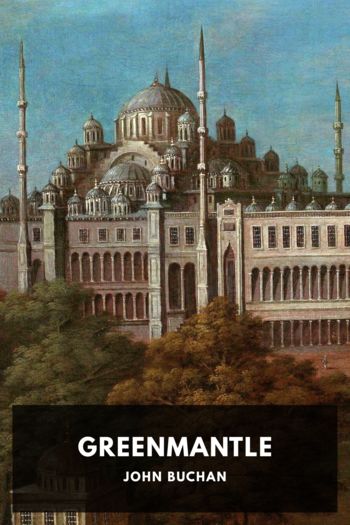Mr. Standfast - John Buchan (autobiographies to read TXT) 📗

- Author: John Buchan
Book online «Mr. Standfast - John Buchan (autobiographies to read TXT) 📗». Author John Buchan
In brisk, shining weather, with a wind from the southeast, we put off next morning. In front was a brown line of low hills, and behind them, a little to the north, that black toothcomb of mountain range which I had seen the day before from the Arisaig ridge.
“That is the Coolin,” said the fisherman. “It is a bad place where even the deer cannot go. But all the rest of Skye wass the fine land for black cattle.”
As we neared the coast, he pointed out many places. “Look there, Sir, in that glen. I haf seen six cot houses smoking there, and now there is not any left. There were three men of my own name had crofts on the machars beyond the point, and if you go there you will only find the marks of their bit gardens. You will know the place by the gean trees.”
When he put me ashore in a sandy bay between green ridges of bracken, he was still harping upon the past. I got him to take a pound—for the boat and not for the night’s hospitality, for he would have beaten me with an oar if I had suggested that. The last I saw of him, as I turned round at the top of the hill, he had still his sail down, and was gazing at the lands which had once been full of human dwellings and now were desolate.
I kept for a while along the ridge, with the Sound of Sleat on my right, and beyond it the high hills of Knoydart and Kintail. I was watching for the Tobermory, but saw no sign of her. A steamer put out from Mallaig, and there were several drifters crawling up the channel and once I saw the white ensign and a destroyer bustled northward, leaving a cloud of black smoke in her wake. Then, after consulting the map, I struck across country, still keeping the higher ground, but, except at odd minutes, being out of sight of the sea. I concluded that my business was to get to the latitude of Ranna without wasting time.
So soon as I changed my course I had the Coolin for company. Mountains have always been a craze of mine, and the blackness and mystery of those grim peaks went to my head. I forgot all about Fosse Manor and the Cotswolds. I forgot, too, what had been my chief feeling since I left Glasgow, a sense of the absurdity of my mission. It had all seemed too farfetched and whimsical. I was running apparently no great personal risk, and I had always the unpleasing fear that Blenkiron might have been too clever and that the whole thing might be a mare’s nest. But that dark mountain mass changed my outlook. I began to have a queer instinct that that was the place, that something might be concealed there, something pretty damnable. I remember I sat on a top for half an hour raking the hills with my glasses. I made out ugly precipices, and glens which lost themselves in primeval blackness. When the sun caught them—for it was a gleamy day—it brought out no colours, only degrees of shade. No mountains I had ever seen—not the Drakensberg or the red kopjes of Damaraland or the cold, white peaks around Erzerum—ever looked so unearthly and uncanny.
Oddly enough, too, the sight of them set me thinking about Ivery. There seemed no link between a smooth, sedentary being, dwelling in villas and lecture-rooms, and that shaggy tangle of precipices. But I felt there was, for I had begun to realize the bigness of my opponent. Blenkiron had said that he spun his web wide. That was intelligible enough among the half-baked youth of Biggleswick, and the pacifist societies, or even the toughs on the Clyde. I could fit him in all right to that picture. But that he should be playing his game among those mysterious black crags seemed to make him bigger and more desperate, altogether a different kind of proposition. I didn’t exactly dislike the idea, for my objection to my past weeks had been that I was out of my proper job, and this was more my line of country. I always felt that I was a better bandit than a detective. But a sort of awe mingled with my satisfaction. I began to feel about Ivery as I had felt about the three devils of the Black Stone who had hunted me before the war, and as I never felt about any other Hun. The men we fought at the Front and the men I had run across in the Greenmantle business, even old Stumm himself, had been human miscreants. They were formidable enough, but you could gauge and calculate their capacities. But this Ivery was like a poison gas that hung in the air and got into unexpected crannies and that you couldn’t fight in an upstanding way. Till then, in spite of Blenkiron’s solemnity, I had regarded him simply as a problem. But now he seemed an intimate and omnipresent enemy, intangible, too, as the horror of a haunted house. Up on that sunny hillside, with the sea winds round me and the whaups calling, I got a chill in my spine when I thought of him.
I am ashamed to confess it, but I was also horribly hungry. There was something about the war that made me ravenous, and the less chance of food the worse I felt. If





Comments (0)